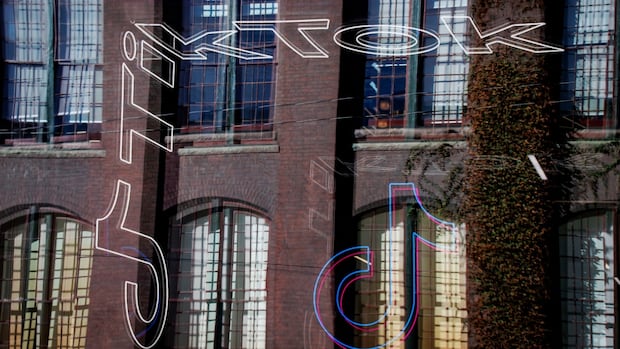A looming TikTok ban in the US is beginning to take effect for content creators whose livelihoods depend on the popular video app.
The ban is expected to take effect on January 19 after the Supreme Court heard arguments on the move on Friday following months of debate. Congress has backed a ban due to privacy concerns at Chinese parent company ByteDance, while TikTok lawyers argue a ban would violate users’ freedom of speech.
Washington, DC-based wedding stylist Kati Kons, who posted about the ban on her TikTok handle @portraitofabrideonfire, says she is at risk of losing her business.
“It really hit me when I thought: 90 percent of my business comes from TikTok. Ninety percent of my customers,” she said. “I don’t think I’ve had a single customer request via Instagram.”
Kons has been posting about queer wedding fashion and politics on TikTok for about a year to more than 23,000 followers and says it has opened more doors than she ever imagined possible.
She has had some success encouraging her TikTok followers to switch to her Snapchat and Bluesky accounts.
More recently, Kons has urged people to boycott meta-platforms such as Facebook, Instagram and Threads, as well as X, Google, YouTube and LinkedIn for supporting the TikTok ban.
“I just prefer to see a consequence of them not listening to people,” she said.
Supreme Court justices on Friday examined the nature of TikTok’s speech rights and the government’s national security concerns. Joanne Molinaro, a full-time TikTok content creator in the US, says that singling out TikTok “seems arbitrary,” adding that the potential ban will “hit the bottom line” of small businesses and creators.
She says the government pushing the ban is a sign of a “massive” divide between politicians and the American public.
This opinion is shared by Nikita Redkar, a comedian from Brooklyn, New York, who has almost 800,000 followers on TikTok as @nikitadumptruck.
She says content creators are angry.
“There is a cost of living crisis, there is a climate crisis, there are so many crises, but somehow the entire US government got together to vote on this,” Redkar said. “It seems like a very obvious way to control the narrative.”
TikTok is expected to be removed from app stores
Under the law, TikTok will be banned on January 19 unless ByteDance divests the app, which there is no sign of. If the ban goes into effect, the app is expected to be removed from app stores and its 170 million American users will no longer be able to receive updates for it. People can still keep it on their phones, but without updates it will get worse over time and the company may choose to deny its users access to it before that happens.
However, US President-elect Donald Trump has indicated he no longer supports the ban, raising the possibility of a reversal when he takes office on January 20.
Another Chinese short-video app, RedNote – called Xiaohongshu in China – has shot to the top of Apple’s App Store charts in the US as some TikTok creators migrate there in anticipation of the ban.
Founded in 2013, Rednote has around 300 million active users, although some fear it could also be banned in the US for the same reasons as TikTok.
Redkar, the comedian, began posting on TikTok during the pandemic in 2021 and discovered an audience beyond what she was able to achieve in her several years as a stand-up comedian.
She found a niche in explaining the news in a comedic and easy-to-understand format, addressing controversial topics as if she were relaying “high school drama” and gossip. Since then, Redkar has found a strong community of other political content creators and makes money through brand deals on the platform.

She says the reality of the ban is just beginning to sink in.
“It’s definitely scary. I don’t think I fully grasped what could happen, but now I’m kind of preparing for the reality,” she said. “I start talking to my audience about switching to other apps and then just share my honest thoughts about it.”
Redkar is worried that her political content won’t perform as well on other platforms like Instagram Reels, and says she’ll also miss TikTok’s video editing features.
“It will be chaotic”
“I think my income will be significantly impacted if I only get paid to advertise on Instagram,” she said. “Now I kind of have to hurry up and use some of these other apps like YouTube, but then there’s going to be a big influx of people going to YouTube…It’s going to be chaotic for a while.”
Redkar hopes the ban will be put on hold and give creators more time to think about their next steps or develop a new app that reflects TikTok’s “community” feel.
TikTok has not been banned in Canada, although the company was ordered to halt its Canadian operations last year, and federal officials have not been able to access the app on government phones since February 2023.
Content creators in Canada are also feeling the uncertainty as American brand deals close and a significant portion of their followers are in limbo.
Joey Pittari, a Toronto-based model who has 3.5 million TikTok followers under the username @joewoahy, has been on the platform since its inception and was previously at Musical.ly before it merged with TikTok.

Pittari says he doesn’t know what his career would be like if he hadn’t built his social media through comedy skits and lip-sync videos.
“I think we’re still going to be affected (as Canadians) because a lot of our followers are based in America and a lot of these brands are American,” he said.
Pittari says he’s trying to stay positive and hopes it doesn’t affect him too much. In the meantime, he plans to continue posting content on other platforms and encouraging his followers to join in.
“I mean, that’s all I can really do, right?”



